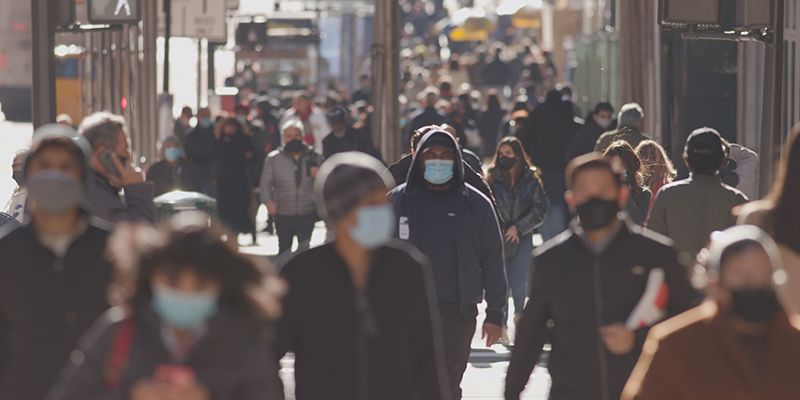
The University has partnered with the World Health Organisation to create a global strategy to protect populations against future threats such as the COVID-19 pandemic.
Leeds has been tasked with developing and implementing the WHO's Health Systems for Health Security (HSforHS) framework, with the aim of building resilient systems and healthier populations. As a result of this work, Leeds is in the process of becoming an official WHO Collaboration Centre.
The framework is the WHO’s response to the worldwide weaknesses in health security exposed by COVID-19. Developed by an interdisciplinary team of experts in medicine, public health, political science and law at the University, it will provide evidence-led guidance to help close gaps in health systems – organisations that deliver healthcare to populations – and enable countries to improve health security by preparing for events such as pandemics and other health risks including antimicrobial resistance.
It will be presented next week at the Workshop on Health Systems for Health Security – an online event hosted by Leeds and featuring talks from international experts and WHO member states on their experiences of managing public health during the virus outbreak.
“Together we can work to protect people around the world from health crises in years to come.”
Leeds was invited by WHO to develop the framework following work by Professor Garrett W. Brown, Chair of Global Health Policy in Leeds’ School of Politics and International Studies (POLIS). A paper by Professor Brown, "COVID-19: time for paradigm shift in the nexus between local, national and global health", highlighted the need for transformation in how pandemics and global health are tackled, with a focus on health system strengthening and better preventative policies.
He said: “COVID-19 has demonstrated that building, strengthening, and maintaining responsive and resilient health systems is critical in preventing, preparing and responding to public health emergencies, which promotes overall health security and long-term wellbeing.
“The new HSforHS framework aims to provide policy and technical responses to current global health challenges exposed by COVID-19 as well as future risks.”
Professor Simone Buitendijk, University Vice-Chancellor, said: “Experts at Leeds have been working tirelessly to deepen our collective understanding of the pandemic's impact on society, from our health to our finances, and how it exacerbates inequalities.
“The WHO’s recognition of the work by Professor Brown and colleagues, and Leeds’ selection as its Collaboration Centre on Health Systems for Health Security is a great honour. It will help us to build on our vision of Universal Values, Global Change.
“Together we can work to protect people around the world from health crises in years to come.”
Global health challenges
Leeds’ work has identified several challenges to achieving health security around the world. The current provision by countries often only minimally addresses health security aspects, while health structures and processes are often disconnected. There is a shortage of experts, leaders and policymakers who can master and link both health systems and health security aspects, and more research is needed to show how increasing healthcare capacity can contribute to better long-term health security.
The Workshop on Health Systems for Health Security, which takes place online on Thursday, 20 May from 11am to 4pm BST, will see global health leaders working together to solidify a common understanding of how HSforHS improves countries’ ability to prevent, detect and respond to threats and events.
The interdisciplinary event will be introduced by Professor Buitendijk and Dr Stella Chungong, WHO Director for Health Security Preparedness. Governance, finance and healthcare leaders from several countries will outline what COVID-19 has taught them about strengthening their health systems and discuss the key areas for improving countries’ health security.
The event will create a network of experts from countries, academics and partner agencies to establish the benchmarks for reaching health security and which can help take forward the Health Systems for Health Security framework.
“Strengthening now will build healthier societies which will pay public health dividends in the future.”
Following the event, the team at Leeds will conduct a research project reviewing COVID-19 data to identify common findings and recommendations, and test the framework against them.
They will also help develop a HSforHS Return on Investment (RoI) toolkit so that member countries can determine how key investments in health system capacity building can generate long term health security dividends and population health outcomes.
The team is also collaborating with WHO on a training package to be delivered at Leeds.
Dr Tedros Adhanom Ghebreyesus, WHO Director-General, said: “COVID-19 is not just a global health emergency, it is a vivid demonstration of the fact that there is no health security without resilient health systems, or without addressing the social, economic, commercial and environmental determinants of health.”
Professor Brown said: “If states and international organisations can adopt this framework, then we can advance a more holistic approach to health system strengthening nationally and globally.
“This approach includes proper investments in common goods for health, and proper policies to better prevent and sufficiently respond to health risks, whether they are communicable or non-communicable, immediate or far distant.
“Strengthening now will build healthier societies which will pay public health dividends in the future.”
The event is open to participants from partner agencies, academic institutions, students and any others interested in the topic from all around the world.
Registration for the workshop is via the HSforHS website.
Further information
For media enquiries, contact University of Leeds press officer Lauren Ballinger via l.ballinger@leeds.ac.uk.
Picture: Adobe stock